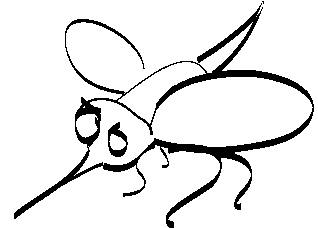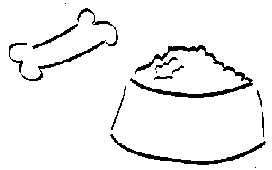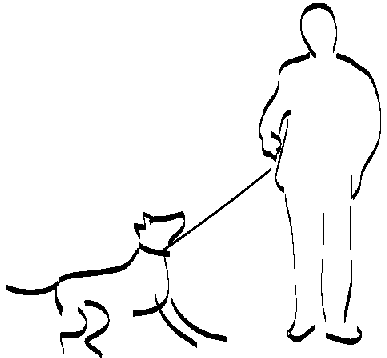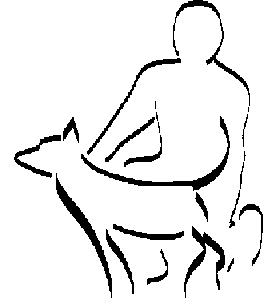Canards Canins
Québec Dog Owners Journal
"Don't skip a beat"
INFORMATION
Annick Jasmin
Jasmin & Associés
(514) 878-1070
|
This material is provided
as an educational
service by
Merial Canada inc.
producers of Heartgard®.
|
|---|
- Introduction
Healthy heart tips for
the one you love
One of life’s greatest experience is loving a dog.
They provide
their owners with unconditional, limitless affection
and ‘to die
for’ loyalty. The special human/animal bond that
develops with
time is unique.
No wonder dogs are a man’s best friend !
- Being a perfect dog owner :
easy steps

-
I take him to the vet for regular checkups and vaccinations
- I exercise him every day
- I feed him high quality food
- I give him fresh water
- I play with him every day
- I have safe toys for him
- I keep him bathed, brushed and beautiful
- I have house trained him
- I am always compassionate
- Being a responsible dog owner :
recognizing signals
| Unhealthy
|
Healthy
|
- Lifeless, runny eyes
- Runny or dry nose
- Dull or uneven coat , shedding
- Scratching
- Ears red and/or smelly,
black waxy material
- Listless and not playful
- Soft or runny stool
|
- Energetic, bright eyes
- Wet, cool nose
- Glossy, full coat
- Clean, pink ears
- Energetic, alert and playful
- Active, good appetite
|
- Vaccinations
- Heartworm and parasite control
- Flea prevention
- Dental care
- Nutrition
- Training/obedience tips
- Another friend, the veterinarian

- Your veterinarian is there to provide
the expertise needed to diagnose,
treat and prevent disease.
- His goals are to minimize health problems
and optimize health.
- Schedule regular visits for check-ups and
immunizations that protect
your pet from serious disease.
- Ask him about vaccination, heartworm
and parasite infections,
fleas, dental care and nutrition.
- Be sure to see your vet at the first
sight of a health problem
- Your dog depends on you for the best
care and you
depend on your vet to keep your pet in peak health
- Some tips about
heartworm disease
 Q- Can my dog get heartworm disease ?
Q- Can my dog get heartworm disease ?
A- Yes. Every dog can be at risk, indoors and out.
Q- How can he catch it ?
A- Dogs get heartworm disease from mosquitoes.
It is the female mosquitoe
that bites and transmits the infection.
They are very tiny and can easily
slip through cracks around windows, doors and screens.
Q- Are some dogs more susceptible than others ?
A- No dog or breed of dog is immune to heartworm disease.
The mosquitoe that bites your
dog could be carrying this common and deadly parasite.
If untreated, he could die.
Q- How can I tell if my dog has heartworm disease ?
A- Signs of heartworm disease can take as long as
4 to 7 months to appear after initial infection. However,
an infected dog may start coughing within 4 months
of infection. Other signs may include sluggishness,
weight loss, and difficulty breathing. A dog that
is typically active may become less active. If you suspect
your dog has heartworm disease, your veterinarian
can perform a simple diagnostic blood test
Q- When is the right time to get my dog tested ?
A- Mosquitoes, the carrier of heartworm disease, can
be found at varying times of the year depending on
the climate. In Canada they usually appear some
time during the spring.
Q- How can I prevent my dog from getting heartworm
disease in the future ?
A- If your veterinarian determines that your
dog is free of heartworms, he or she will tell you how easy
and convinient prevention can be. It’s important
to follow your veterinarian’s instructions; if you don’t, your
dog could still be at risk. Remember, the first,
most important step is to have your dog tested
for heartworms.
Q- What would be the best prevention for my dog ?
A- Ask your veterinarian for the most reliable
easy to give prevention treatment that your animal will
enjoy taking. There are several treatments available.
One of them is chewable and is the only one that is
100 % beef flavoured. Because it is easy to administer
and can be given as a treat your dog’s acceptance to
this treatment will lead to a guaranteed compliance.
- Some tips about nutrition
 Your dog’s diet changes with each life stage
Your dog’s diet changes with each life stage
The smallest variations in your care can have
a tremendous influence on how your pet looks,
feels and acts. Remember, a ‘’one size fits all’’
approach to nutrition is not appropriate
Puppy
- They often require extra care and attention
- The ‘’early years’’ are the ‘’healthy years’’
Adults ( 1-6 years )
- You need to evaluate your dog’s
activity level, breed type
- Is your dog a hunting, sport or working dog ?
- It is important to know that obesity
is the most common nutritional disease of dogs
Older dogs ( +6 years)
- Owners must alter the way they care
for their older pets as the dog’s body and daily
activity levels change
- Older dogs have a greater risk of
developping health problems such as kidney and heart
disease and also may have special
digestive needs.

-
Some grooming tips
- Groomers examine your dog from nose to tail
and all observations are an
excellent form of preventive pet health care.
- Ear cleaning, nail clipping and flea
control as well as bathing,
brushing and combing makes for a happier pet.
- Dog training basics
and reminders
Timing

- The timing of corrections and the
praise must be impeccable
- It is too late to correct or praise
if the dog is not doing what you want
to reinforce
- Reinforcement must happen as the
behavior is happening
Consistency
- If you do not want your dog on
the couch, then he should never be
allowed on the couch
- Dogs do not understand sometimes or maybe
- They only understand always and never !
Praise
- We focus too often on correction rather
than say a good word when things are going well
- Let them know when they are good dogs
- Dog training class instructors have a
much more difficult time getting dog owners
to praise
their dogs than they do in getting them to
correct their dogs
Firm
- Tell your dog, don’t ask him
- If he doesn’t comply, then show him
- Firm does not mean mean
Fun
- Break up training with energetic games
- Games give everyone a stress break
Jacques Beaulieu, webmaster
"Don't skip a beat"
last revised August 6, 2002
jacqbeau@canardscanins.ca
|


 Q- Can my dog get heartworm disease ?
Q- Can my dog get heartworm disease ?  Your dog’s diet changes with each life stage
Your dog’s diet changes with each life stage


 Such a program includes :
Such a program includes :